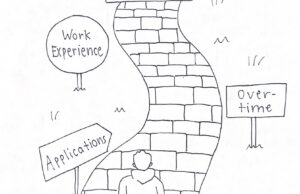Editorial: Schools and mental health: a complex and flawed relationship
We all know the stories. A student displays the tell-tale signs of a mental disorder. People around him or her notice, but never take action, and the student never receives help. The story ends with a breakdown, dangerous life choices, and in the worst cases, with the student taking his or her own life. Adults who tell these stories hope that students dealing with mental health issues will seek help. Unfortunately, the necessary resources are not available on high school campuses.
According to a study published in the American Journal of Preventative Medicine, less than 25% of high school students with signs of psychological disorders ever seek help. Most of the time, students do not reach out because they are scared of counselors contacting their parents.
They have every right to be worried. Under the current procedures, a school counselor who is contacted by a student seeking mental aid is required to reach out to that student’s parents. Because school counselors are not licensed psychologists, they are not in a position to diagnose or otherwise help a student who is seeking psychological aid outside of simply referencing out-of-school therapists. For many students, especially ones with mental health issues, relationships with parents can be tense and problematic. If students have relatively positive relationships with their parents, they have probably already sought their parents for advice on mental health issues, so counselors directly contacting parents is not ideal. Having a direct referral to a parent deters many from pursuing assistance from an adult, and can even worsen their situation.
The only case in which a parent will not be contacted is if parents are suspected of being abusive. In this case, the counselor is required to contact Child Protective Services (CPS). So when a student reaches out for help, counselors have to either call the student’s parents, or call CPS: there is no in-between. Neither of these scenarios is favorable for a student who needs help with mental health problems.
In order to provide constructive help to these students, schools should employ a professional therapist who can listen to students and fully evaluate the situation before involving parents. Although Newbury Park has a school psychologist, she is specifically employed to help special education students, not the general student body. On-campus therapists could help curb the stigma surrounding mental health. Students would feel more free to consult therapists for any problems, both minor and major, just as they feel comfortable going to the nurse for a bloody nose or an upset stomach. Seeing multiple peers seeking help might even encourage others to follow in their footsteps and decrease the fanfare that often comes with the idea of visiting a therapist.
Of course, parent involvement in health actions should never be compromised. But school therapists could make better decisions on how to contact parents and what to explain, as their licenses make them better fit for the job than school counselors who are only trained to help with academic issues. Students who cannot afford mental health even when it is so necessary for them to attain it could be saved from any unfortunate events with the help of a school therapist.
On-campus therapists are especially important for students who live in low-income households, because mental health treatment is not usually covered by health insurance or government assistance programs. According to the National Institute of Mental Health found that the average expenditure spent on mental health care per person for children aged 0-17 was $1,931, a price tag many families are not able to afford. And according to the National Center for Children in Poverty, 85% of youth with a serious mental health disorder living in low-income households do not receive professional help. Some school districts with a high proportion of students from low-income backgrounds have recognized the problem and have started to implement change. In Los Angeles Unified School District, the second largest school district in the country, counselors can refer students showing signs of mental issues to mental health professionals that are school-employed and have clinics near school campuses.
In most colleges and universities, students can visit a therapist on campus during the school year at no expense (the cost is usually covered by room and board payments). Even though college students are legal adults and parental consent is no longer necessary for health treatment, the university model shows that it is possible for high schools to implement some form of on-campus therapists.
As we fight against self-harm, suicide, and other effects of mental disorders, no one can encourage the individuals who suffer from these issues to seek help without providing a readily available avenue for proper treatment. On campus therapists could solve this ongoing problem, preventing the many casualties that come with mental illness.


